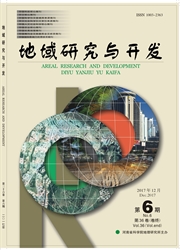

 中文摘要:
中文摘要:
以农户为细胞单元,通过对典型乡镇农户收入的差异分析来探讨影响农村经济发展的主要因素。选取陕西省神木县12个乡镇典型村域进行农户调查和定量评价,运用多元回归对农户收入的影响因素进行分析。各乡镇间人均纯收入差距显著,基尼系数均在0.20以上,67%的乡镇基尼系数大于0.30,其中解家堡、乔岔滩、花石崖的基尼系数更是超过了国际警戒线0.40;乡镇内部农户间的收入差距也十分明显。回归结果显示:耕地面积、第一产业支出是低收入家庭农户收入的重要影响因素;户主受教育程度、非农就业等显著影响着中等收入家庭农户收入;而经济潜力、家庭教育负担、区位因素对高收入家庭农户收入影响显著。研究表明,要增加农户家庭的收入,除了发展个体经济、提升兼业比重外,还应重视农户自身素质的提高,大力发展农村的经济合作。
 英文摘要:
英文摘要:
Through the analysis of the differences in typical household income , factors influencing rural eco-nomic development are discussed in this research .This study used the quantitative analysis and data from a sample conducted on rural households from 12 towns of Shenmu County , Shaanxi Province to examine rural inequality and factors contributing to rural income .This study found that rural income at the household-level was significantly differ-ent across rural towns and among rural households within a town .The Gini indices for all sample towns were more than 0.20, and three towns’were more than the international warning line of 0.40.The income gap within the town was also very great .The multiple regression analysis indicates that some factors , such as literacy and experience of householder , cultivated land area , proportion of primary industry and non-agriculture employment , location, and the local economy potential , etc, have played a significant role in increasing the income .On the whole, cultivated land area , and proportion of primary industry expenses are more important than others in the lower income group of house -holds.In comparison , the householders ’ personal factors and proportion of primary industry also contribute to their income for the households in the medium income group .While in the households of high income group , economy po-tential , the family educational expenses , location as well as per capita expenditure are more sensitive to their income level .To increase farmer ’ s income , in addition to encouraging multiple occupations and improving the quality of farmers, the government also should provide more information for farmers , and implement the corresponding policies .
 同期刊论文项目
同期刊论文项目
 同项目期刊论文
同项目期刊论文
 期刊信息
期刊信息
